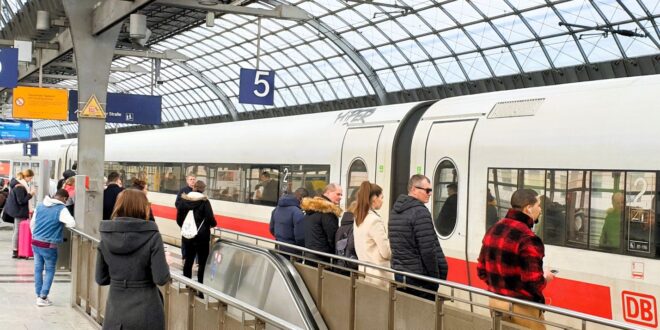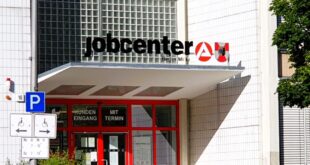Germany is rolling out a series of major legal and administrative changes this December that affect millions of residents.
Whether you are a pensioner, commuter, car owner or regular online shopper, the new month brings changes you should be aware of. Many of these reforms seek to modernise public services, promote digital access and support a more efficient transport system, while maintaining consumer protection and cost stability. Staying informed about such changes is crucial for navigating everyday life in Germany.
Here is a clear overview of what will change and what people should pay attention to, compiled by Femi Awoniyi.
![]()
Pensions: Higher Payments and End of Cash Payouts
From 1 December 2025, the German Pension Insurance (DRV) is changing how pension supplements for disability pensioners and widows/widowers are calculated and paid.
The supplement — previously paid separately in the middle of the month — will now be added directly to the regular pension payment. More importantly, the calculation has been revised. Instead of being based on the amount paid out, the supplement is now calculated from the pensioner’s earnings points, which reflect lifetime contributions.
Most beneficiaries will see an increase between €50 and €140 per month, depending on when they first retired:
-
Retired between January 2001 and June 2014: +7.5%
-
Retired between July 2014 and December 2018: +4.5%
The adjustment is automatic — no application is required.
Cash pension pick-up discontinued
At year’s end, Germany is ending the tradition of allowing pensioners to collect their pensions in cash at the post office. Around 3,300 people without bank accounts are affected. They must now open either a regular bank account or a basic payment account (Basiskonto)—a legal entitlement for every EU resident.
Anyone who does not submit bank details in time may experience temporary delays, though payments will be made retroactively once an account is provided.
![]()
Transport: New Rail Timetable and Expanded Services
On 14 December 2025, Deutsche Bahn launches its new winter timetable, bringing major improvements to long-distance travel, with more frequent and faster train connections.
Highlights include:
- Half-hourly ICE connections between major cities such as Hamburg–Hannover–Kassel and Berlin–Halle–Erfurt
- 14 additional ICE Sprinter services, including a much faster Stuttgart–Berlin route (4h 45min)
- Around 40 new international routes to Belgium, the Czech Republic, Denmark, Poland and Switzerland
- New direct links such as Kiel–Stuttgart and Stralsund–Frankfurt
Some low-demand connections will be reduced, including the Leipzig–Nuremberg line via Jena, due to rising operating costs.
Good news: Despite the expanded service, prices remain unchanged:
- Super Saver tickets from €17.99
- Saver tickets from €21.99
- Flex fares unchanged
- BahnCards 25, 50 and 100 remain at current prices
Mobility: Remote Vehicle Operation and Digital Car Documents
Germany is entering a new era of mobility regulation.
From 1 December, it becomes legally possible to remotely control vehicles from central command centres. This applies in a five-year test phase to:
- Car-sharing vehicles
- Driverless taxis
- Rental cars that need repositioning
This marks a major step towards autonomous mobility in everyday transport.
Digital vehicle documents
The new i-kfz app allows motorists to store vehicle documents — starting with the vehicle registration certificate (Fahrzeugschein) — directly on their smartphone.
Users can:
- Access the registration any time
- Share a copy easily (e.g., if borrowing a family member’s car)
- Receive reminders for administrative deadlines such as the vehicle inspection (TÜV)
New Online Shopping Rule: Mandatory “Cancel Button”
From 19 December 2025, online retailers must provide a visible, easy-to-use electronic cancellation button (Widerrufsbutton) on their websites.
This lets consumers exercise their 14-day right of withdrawal with just a click without searching through long forms or contacting customer service.
The obligation applies to:
- Purchase contracts
- Service contracts
- Financial services contracts
This strengthens consumer rights and simplifies returns.
![]()
Media Reform: Major Restructuring of Public Broadcasting
With the new Broadcasting Treaty taking effect on 1 December, Germany’s public broadcasters—ARD, ZDF and Deutschlandradio—begin a deep restructuring aimed at reducing costs and increasing digital output.
Key changes
- The number of public radio stations will fall from 70 to 53
- Niche television channels such as Phoenix, ZDFinfo, ARD-alpha and tagesschau24 will be merged
- Children’s channel KiKA and cultural channel 3sat will lose their independent station status and move towards digital formats
- Traditional broadcasting via satellite, cable and FM radio will gradually be scaled back
State governments support the reform to keep the broadcasting fee stable at €18.36 per month until end of 2026.
![]()
 THE AFRICAN COURIER. Reporting Africa and its Diaspora! The African Courier is an international magazine published in Germany to report on Africa and the Diaspora African experience. The first issue of the bimonthly magazine appeared on the newsstands on 15 February 1998. The African Courier is a communication forum for European-African political, economic and cultural exchanges, and a voice for Africa in Europe.
THE AFRICAN COURIER. Reporting Africa and its Diaspora! The African Courier is an international magazine published in Germany to report on Africa and the Diaspora African experience. The first issue of the bimonthly magazine appeared on the newsstands on 15 February 1998. The African Courier is a communication forum for European-African political, economic and cultural exchanges, and a voice for Africa in Europe.



































